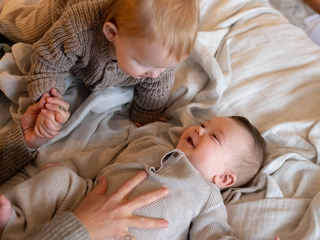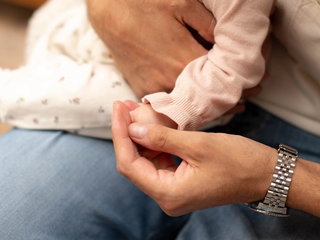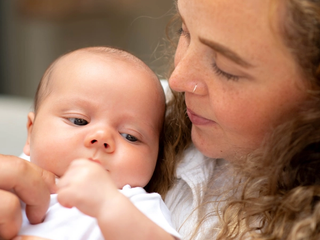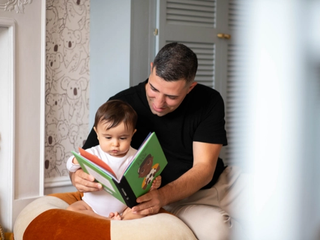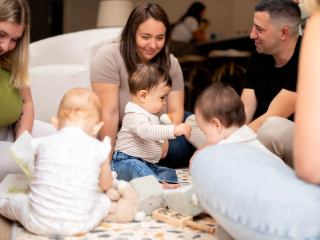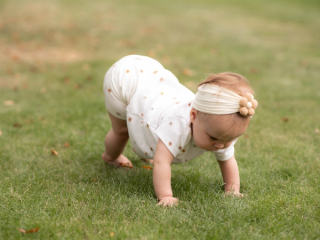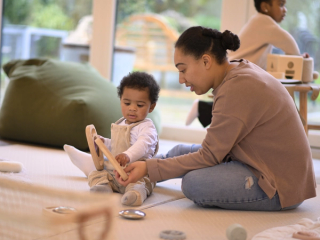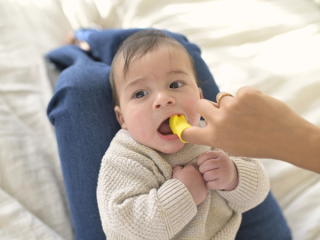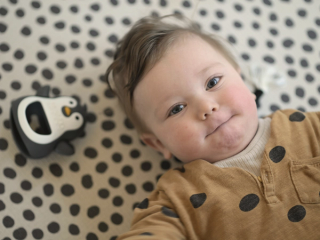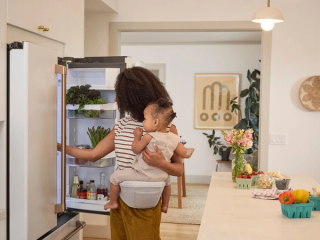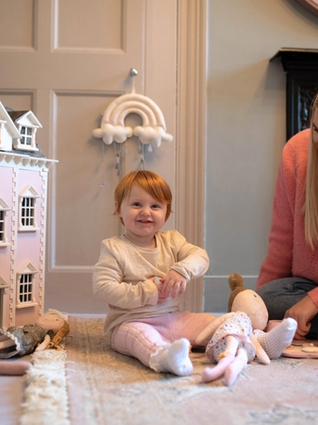
- Home
- Advice Hub
- Baby
- Bonding & Development
- Demystifying Play With Your Baby
Demystifying play with your baby
In this article our Learning & Play Expert, Ruth, covers how to prioritise play with your little one!
As parents we are continually doing our best, trying to fit everything in to the modern demands of society. The world around our babies is ever changing and evolving; however, child development has remained the same. The most basic things – talking, singing and playing with your baby – still remain the best things to support your child’s development, but it can be a daunting thing to start for many new parents.
Historically, humans evolved in a communal context where parents had lots of support from wider family and the community. Even in more recent history there was access to more facilities such as family groups and parenting support, which due to lack of funding have closed or privatised in many areas. Now a days, this lack of support or ‘village’ means that stress, time constraints and every day demands can impact on our capacity to emotionally connect, play and spend 1:1 time with our babies and children. It can sometimes feel like the last thing on the list. We are tired. We still have all the same things to do, but we’re doing them without the ‘village’ they say it takes to raise a child.
Despite best intentions, this lack of wider communal support can mean that by the time the daily jobs have been completed, work is done and other siblings cared for, there is little energy left in the tank for thinking about playing with your baby.
Not only this, but quite often parents don’t really know where to begin. It’s cliché to say, but babies aren’t born with a manual! I always say I wouldn’t try to cut my child’s hair because I wouldn’t know where to begin, and yet we expect parents to be in an appropriate place to feel empowered to support their child’s development through play from day one!
Another reason why play can often be difficult to initiate is that parents find it difficult to know what toys are age appropriate for a baby and actually what to do with them. You may or may not have had a parent who modelled this to you, so it can feel very new territory if you don’t have the back catalogue of connection and play with a baby to pull upon. Many adults find that when we play with older children it’s easier in one way as they will take the lead, guide the play and we can clearly take on a role. For example, having a teddy’s bears picnic or rolling cars down a ramp.
However, playing with a baby can be extremely daunting – especially in the early days when we don’t get much back from them. As a busy mum of two and founder of My Mummy Teacher, I know only too well how hard it can be to find your rhythm when it comes to playing with your baby. You may still be recovering from birth on top of all the other things mentioned above. But the good news is, little and often is key!
For your baby the world is brand new. That in itself is a sensory experience. You can harness this to use the everyday to provide play experiences for your baby.
Here are my top tips for prioritising play with your baby:
- Find your rhythm. Plan in it to your day. Just like you would anything else, carve out and protect at least 10 minutes each day of quality time that you will get down to your baby’s level, connect and play with them. This will be at different times to suit your family and schedule but once you start it will become part of your daily routine and rhythm. I use my play planner to support me to do this as if it’s written down it’s much more likely to happen!
- Take the pressure off. Play doesn’t need to look a particular way; it doesn’t need to be ‘Pinterest worthy’; it doesn’t need to be expensive. Actually for babies and young children you will find that you can buy them all the toys in the world; however their favourite thing to play with will be a real life household object!
- Explore treasure baskets. Sounds fancy - but it really isn’t. Simply grab a basket or box, go round your house and find items your baby might like to explore such as a hand held mirror, spoon, flannel, peg, ribbon etc. Try to find things that appeal to their different senses. Pop it in the basket and let them explore!
- Use everyday items you have around the home to add to your play. This is why I created the learning through play activity cards because play doesn’t need to be expensive and children don’t need heaps of toys! Pick a learning through play activity card, set it up, off you go! Set it up before you go to bed and let your baby discover it – they will always have more interest in it this way. Discovery is key to developing the inquisitive mind and this way we can allow them to discover and explore safe items in a controlled way. You can find some examples of my learning through play activity cards here!
- Choose a different sense to focus on each day. You could start with vision and use black and white images or hearing and get some bells or pots and pans for your little one to play.
- Most importantly, relax, have fun and remember in the crazy days that actually connection and play with your baby is the best thing you can do to support their brain development. Getting down to their level and mimicking their interactions, acknowledging them and developing their senses doesn’t need to cost anything, can become a part of your daily routine and trust me, the more you do it the easier it will become!
Advice & tips

Want to read more? Join the HiPP BabyClub for full access to this article.
As a BabyClub member, you'll get access to a range of exclusive benefits, including:
Monthly competitions
Discounts from our Partners
Expert advice tailored to your little one's age
Weaning recipes
HiPP shop discounts*
*10% off HiPP's online shop does not apply to our First Infant, Anti-Reflux or Comfort Formula Milk.
Important notice: Breastfeeding is best. Follow on milk should only be used as part of a mixed diet from 6 months. Talk to a healthcare professional.




